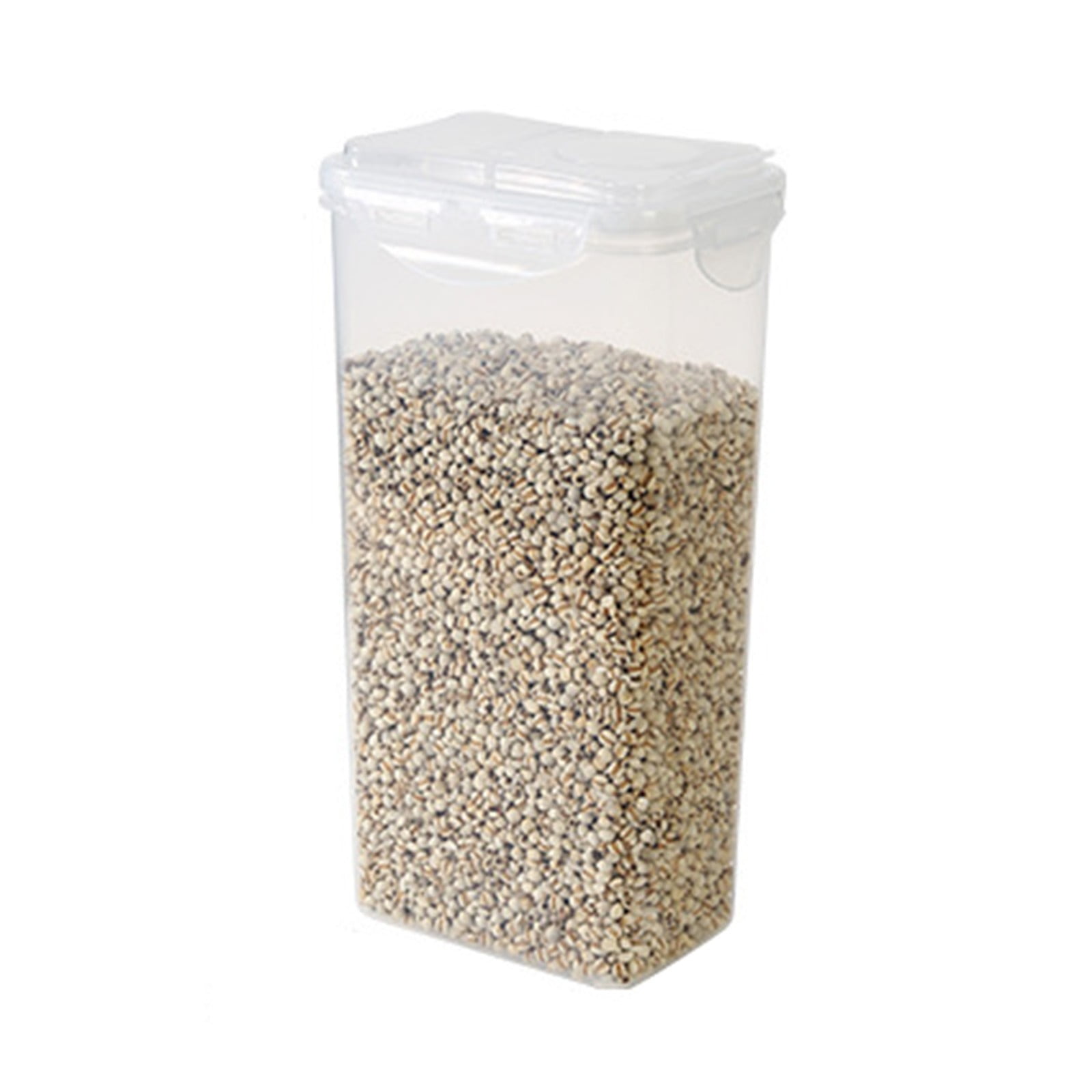The Role of Mass Plastic Containers in Effective Recycling Practices and Sustainability
Mass plastic containers are important to modern-day reusing efforts. Their style improves the performance of product collection and transportation, adding to sustainability goals. These containers not just optimize room yet likewise assist in monitoring contamination levels. Nevertheless, their implementation is not without challenges. Comprehending the complete scope of their impact discloses a complicated partnership in between logistics and ecological responsibility that warrants additional exploration.
Comprehending Mass Plastic Containers
Bulk plastic containers act as a necessary part in various industries, assisting in the storage space and transportation of products. These containers are generally made from robust materials such as high-density polyethylene (HDPE) or polypropylene, which supply longevity and resistance to ecological factors. Their layout frequently consists of functions like stackability and modularity, permitting reliable use space throughout both storage space and transit.
Industries such as farming, food processing, and manufacturing often make use of mass plastic containers as a result of their light-weight nature and simplicity of handling. The containers are available in various dimensions and arrangements, accommodating the specific requirements of various products. Their adaptability expands past simple functionality; they can likewise be customized with covers, manages, and classifying options to improve functionality - plastic bulk containers. Consequently, mass plastic containers play an essential role in enhancing logistics and supply chain procedures throughout several industries, consequently contributing to overall effectiveness and cost-effectiveness
Benefits of Using Bulk Plastic Containers in Recycling
When organizations prioritize reusing initiatives, the utilization of mass plastic containers greatly improves the performance of the procedure. These containers are created to optimize room, permitting the storage and transport of bigger amounts of recyclable products. This results in fewer journeys to reusing centers, consequently reducing fuel intake and connected emissions.
Additionally, mass plastic containers are immune and durable to various environmental factors, ensuring that materials remain shielded throughout handling and transit. Their light-weight design additionally adds to lower transportation expenses.
The harmony of these containers facilitates better sorting and processing of recyclable products, which can improve total recycling rates. Organizations that adopt bulk plastic containers also show a commitment to sustainability, favorably influencing their brand photo. Eventually, these advantages not just simplify reusing practices but also contribute to wider ecological objectives
Exactly How Bulk Plastic Containers Facilitate Material Collection
Effective product collection is greatly boosted by the use mass plastic containers, as they supply a organized and reliable solution for collecting recyclable things. These containers are created to suit large volumes of products, which streamlines the sorting and storage procedure. Their stackable design makes the most of space application, making it much easier for centers to organize recyclables without mess.
Furthermore, bulk plastic containers are weather-resistant and sturdy, enabling outside placement without degradation. This strength guarantees that products remain protected until they are gathered for processing.

The harmony in shapes and size of these containers assists in standardization throughout collection factors, making it possible for far better monitoring of recyclable volumes. Furthermore, their transparent nature permits easy presence of materials, assisting in the surveillance of contamination levels and ensuring that just ideal materials are gathered. In general, mass plastic containers play an important duty in improving the product collection procedure, consequently promoting effective reusing methods.
Transport Efficiency and Environmental Effect
Transportation efficiency plays a vital role in the recycling process, especially via the optimization of load capability wholesale plastic containers. By optimizing the quantity of material transferred, business can substantially decrease the number of journeys needed, therefore decreasing their carbon impact. This approach not only boosts operational efficiency yet additionally adds to a lot more lasting ecological techniques.

Enhancing Tons Capability
Although maximizing tons ability is commonly forgotten, it plays an important duty in enhancing transport efficiency and decreasing ecological impact in recycling practices. By taking full advantage of the volume that bulk plastic containers can hold, reusing procedures can reduce the number of trips required for transportation. This not only lowers fuel intake but likewise reduces the wear and tear on automobiles. Effective load management permits centers to use area efficiently, making certain that each transport cycle is as efficient as feasible. Additionally, well-optimized tons can cause better negotiations with logistics service providers, possibly decreasing general prices. Ultimately, enhancing lots capacity adds to a much more lasting recycling system by promoting reliable resource use and minimizing waste produced during transportation.
Decreasing Carbon Footprint
As recycling procedures venture to lessen their environmental impact, lowering the carbon footprint connected with transport becomes an essential goal. Bulk plastic containers play a critical duty in achieving this aim by improving tons efficiency and maximizing logistics. Their light-weight yet sturdy layout allows for optimum freight room application, lowering the number of trips needed to transport materials. By consolidating deliveries, recycling centers can reduce fuel usage and greenhouse gas emissions. On top of that, tactically finding recycling centers decreases transportation distances, additionally decreasing carbon outcomes. Utilizing fuel-efficient vehicles and alternative power sources boosts total sustainability. By integrating these practices, the reusing sector can substantially reduce its carbon footprint, contributing to an extra lasting future.
Obstacles in the Use of Mass Plastic Containers

Contamination Issues
Contamination concerns stand for a substantial obstacle in the effective use mass plastic containers within recycling practices. These containers often accumulate residues from previous contents, leading to blended products that can hinder the reusing process. Impurities such as food waste, chemicals, or non-recyclable products can endanger the stability of the entire set, resulting in increased disposal prices and reduced recycling rates. In addition, inappropriate cleaning or sorting can aggravate these issues, making it tough for reusing facilities to refine materials efficiently. The existence of contaminants not just affects the high quality of recycled products however also weakens the general sustainability initiatives aimed at decreasing plastic waste. Addressing these contamination obstacles is crucial for enhancing the effectiveness of bulk plastic container recycling.
Recycling Infrastructure Limitations
Inefficiency in recycling infrastructure postures significant obstacles for the efficient management of bulk plastic containers. Several reusing facilities do not have the ability to process large quantities of these containers efficiently, causing boosted prices and hold-ups. Poor sorting innovations usually lead to contamination, as bulk containers may be mixed with various other products, complicating the reusing process. Restricted transport alternatives likewise prevent the movement of bulk plastic containers to ideal reusing centers, causing raised landfill waste. In addition, a lack of standard methods for bulk container recycling creates confusion amongst customers and businesses, further making complex initiatives to advertise sustainability. Dealing with these infrastructure restrictions is important to enhance reusing methods and optimize the potential of mass plastic containers in a round economic situation.
Ideal Practices for Carrying Out Bulk Plastic Containers
When companies think about executing bulk plastic containers in their reusing methods, they ought to prioritize a calculated Full Report technique that improves efficiency and reduces contamination risks. First, selecting the appropriate container dimension and kind is vital to fit the volume of products being processed. Organizations ought to additionally develop clear labeling and signage to direct users on correct disposal methods, lessening complication and mistakes. Regular training sessions for personnel can better enhance these methods, making sure everybody comprehends their duties in preserving reusing integrity.
Furthermore, companies need to carry out a regular maintenance schedule to examine and clean containers, avoiding the build-up of contaminants. Partnering with regional reusing centers can also improve the collection process, guaranteeing that products are properly processed. Organizations need to keep track of and examine their reusing metrics, utilizing this data to refine practices over time and advertise continual enhancement in their sustainability efforts.
The Future of Mass Plastic Containers in Sustainable Practices
As companies progressively prioritize sustainability, the role of mass plastic containers in recycling practices is established to evolve substantially. Advancements in products scientific research are leading to the advancement of naturally degradable and recyclable alternatives, improving the environmental benefits of mass plastic containers. Furthermore, the application of closed-loop systems will certainly enable simpler collection and repurposing of these containers, minimizing waste and source intake.
Technological developments, such as wise tracking systems, will certainly enable business to keep an eye on the lifecycle of mass containers, improving efficiency in recycling procedures. As consumer demand for lasting techniques grows, companies will likely take on bulk plastic containers created for reuse and lasting worth. Additionally, cooperation in between markets and governments will promote the facility of standardized recycling procedures, ensuring that bulk containers are efficiently incorporated into more comprehensive sustainability efforts. Generally, discover this info here the future of mass plastic containers shows up encouraging, with substantial possibility for adding to a round economic climate.
Regularly Asked Concerns
Just How Are Bulk Plastic Containers Made and What Materials Are Utilized?
Mass plastic containers are generally made from high-density polyethylene (HDPE) or polypropylene (PP) These products are refined with injection molding or blow molding techniques, resulting in long lasting, light-weight containers ideal for numerous storage and transportation needs.
Can Mass Plastic Containers Be Reused Several Times Prior To Recycling?
Yes, bulk plastic containers can be recycled numerous times prior to recycling. Their resilience and style enable repeated usage in different applications, advertising sustainability and source effectiveness while reducing the demand for new containers.

What Certifications Exist for Bulk Plastic Containers in Recycling?
Numerous certifications for mass plastic containers consist of the Recycling Partnership's qualification, the Cradle to Cradle Certified ™ criterion, and the Sustainable Packaging Union's guidelines, guaranteeing containers fulfill particular ecological and recyclability criteria for effective recycling.
Just How Do Mass Plastic Containers Compare to Various Other Recycling Storage Space Options?
Bulk plastic containers use higher resilience and capacity compared to various other recycling storage space alternatives, minimizing the danger of contamination and facilitating reliable transport. Their style sustains far better organization, enhancing total effectiveness in recycling operations.
What Is the Life-span of a Mass Plastic Container in Recycling Processes?
The lifespan of a bulk plastic container in recycling processes normally ranges from 5 to ten years, depending upon usage, worldly quality, and environmental problems, allowing for multiple cycles of use prior to eventual disposal or recycling.
When organizations prioritize reusing efforts, the usage of mass plastic containers significantly enhances the efficiency of the procedure. Transport efficiency plays helpful resources an essential duty in the recycling process, specifically via the optimization of lots capability in bulk plastic containers. The use of bulk plastic containers in recycling methods encounters substantial challenges, specifically concerning contamination concerns and restrictions within reusing framework. Contamination problems represent a considerable difficulty in the efficient use of bulk plastic containers within recycling techniques. When companies take into consideration applying bulk plastic containers in their reusing methods, they need to focus on a strategic approach that enhances efficiency and minimizes contamination dangers.